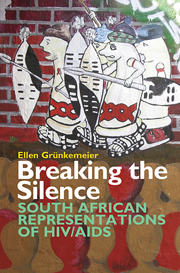2 - Mapping the Terrain: THE SOUTH AFRICAN HIV/AIDS EPIDEMIC
Published online by Cambridge University Press: 05 October 2013
Summary
Between Medicine & Culture
While HIV/AIDS is usually associated primarily with medicine, it is by no means limited to this field. Reaching out beyond medical concerns, HIV/AIDS cuts across discourses and involves a variety of aspects such as historical, economic, political, social, psychological, ethical and cultural issues. Highlighting the abundance of meanings, connotations and attributions generated around HIV/AIDS, Paula Treichler coined the frequently quoted phrase ‘epidemic of signification’ (Treichler 1999, 11). Bringing together the medically connoted term ‘epidemic’ with ‘signification’, which relates to issues of language and meaning, she outlines the broad context and significance HIV/AIDS has come to acquire. ‘The AIDS epidemic is cultural and linguistic as well as biological and biomedical’ (ibid., 1). Edwin Cameron argues along similar lines when he states that ‘AIDS has from the outset been as much a battle of ideas as a battle about bodies, organisms and cells’ (Cameron 2004, 7). Their statements trigger questions that help to explore the unique markers of HIV/AIDS, thus setting the ground for the discussion: Why has HIV/AIDS not been considered solely a medical issue? What makes it stand out from other infectious diseases and thus ultimately prone to the production of meaning? And why is the epidemic likely to generate conflict, as Cameron's use of the battle metaphor suggests?
HIV/AIDS is still not fully understood by medical researchers and, although the syndrome can be medically managed with antiretroviral therapy, neither cure nor vaccine is available.
- Type
- Chapter
- Information
- Breaking the SilenceSouth African Representations of HIV/AIDS, pp. 10 - 28Publisher: Boydell & BrewerPrint publication year: 2013



